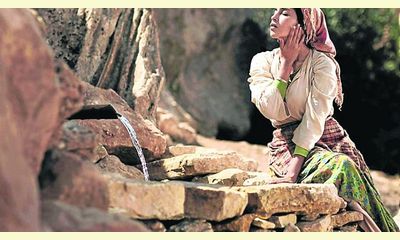|
|
Film: A metaphor for love
un article par La Razón
Video:
Every so often, we have great satisfaction after watching a film. And that's enough to make us sit up and take notice. So it is with the premiere of "La fuente de las mujeres" (The women's spring), a film by Romanian director Radu Mihaileanu, who has won world-wide authority and prestige with his deep and committed films “El tren de la vida” (Train of Life), “Ser digno de ser" (Be worthy of being) and “El concierto” (The Concert) in which the themes of women and religion are the common denominator. "These films refer to a shadow of tragedy and humanity, but they show that people always have a beauty inside and must seek out their dignity," according to Radu who chatted with La Razón at Pantalla Pinamar.

click on photo to enlarge
Radu continues on those themes in "La Fuente", which was inspired by a newspaper article that said that women in Turkey would go on a strike from sex if the men in their village did not solve the problem of running water.
The story of the film does not focus on any particular place "to avoid hurt feelings," says the bearded director. It appears to take place in a small village in Africa or the Middle East. The women go to fetch water in the mountains in the blazing sun, a task they have done since the beginning of time. After an accident to one of them, Leila, a sort of Lysistrata, "proposes to the group that they go on strike for love, no more hugs or sex until they get water in the village."
Mihaileanu stressed "the need for these women to express their suffering through their songs. They sing the news of their people as if they were journalists. They denounce injustice metaphorically, through shaming and demanding the attention of the men."
The resulting conflict in the sharing of household chores revolutionize the organization of the village and according to the precepts of the Koran. "The film, which questions the place of women in some Arab societies, had a good reception in Morocco, for example. Not so in places like Syria, Tunisia and Iran, which directly prohibited it. In this case, therefore, I am in favor of distribution by piracy," says Radu seriously, recalling the complexity and difficulty of the filming. "We shot in different towns in Morocco and there were times when men did not want us left alone with women, and many of the women self-censored out of fear of a backlash from them."
How would you describe your film? "It is a story that advocates gender equality, a plea. Through the theme of water, I sought to build a metaphor for love. Women are often victims in this world. In both East and West love itself is in crisis, and it is for this reason they go on strike, to reinvent love."
Do you think that this film can contribute to a change in history? "You can help by shaking people and waking them up, but I do not think there is any immediate change. But today the audiovisual media, for better or for worse, is the strongest means of education."
(Click here for a Spanish version of this article)
|








|
DISCUSSION
Question(s) liée(s) à cet article:
Prospects for progress in women's equality , what are the short and long term prospects?
* * * * *
Commentaire le plus récent:
The following figures, very revealing, come from the website of the American White House.
. * . * . * . * .

. * . * . . ... continuation.

|
|










